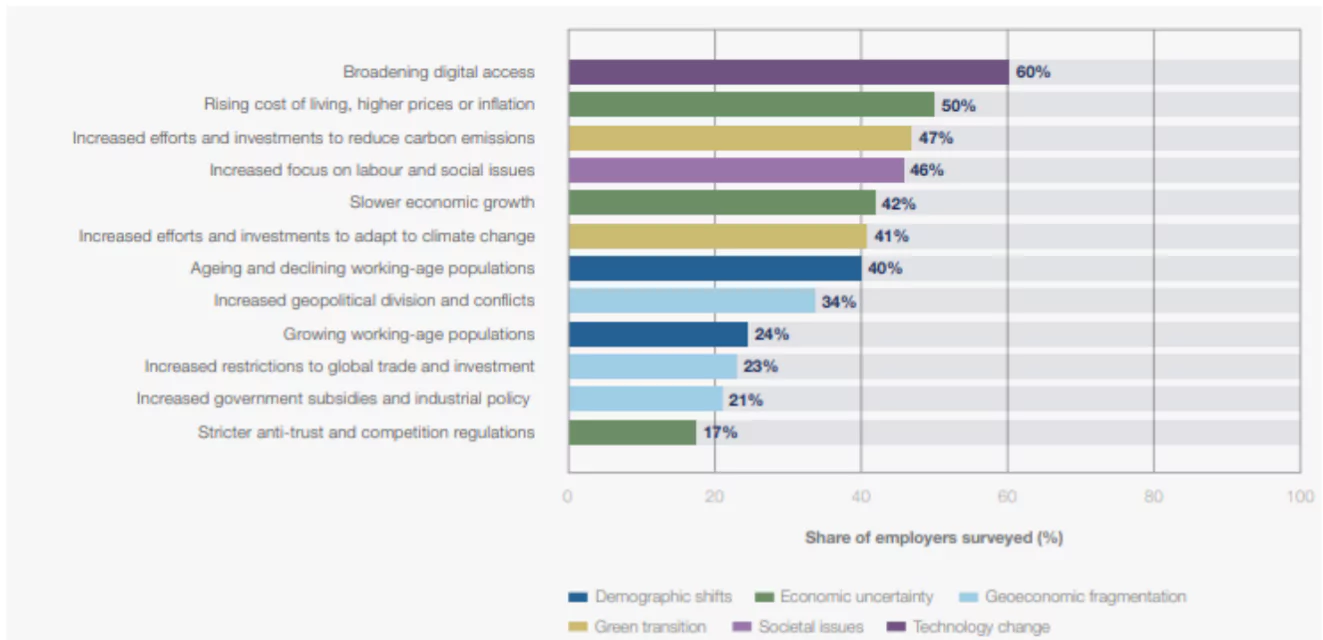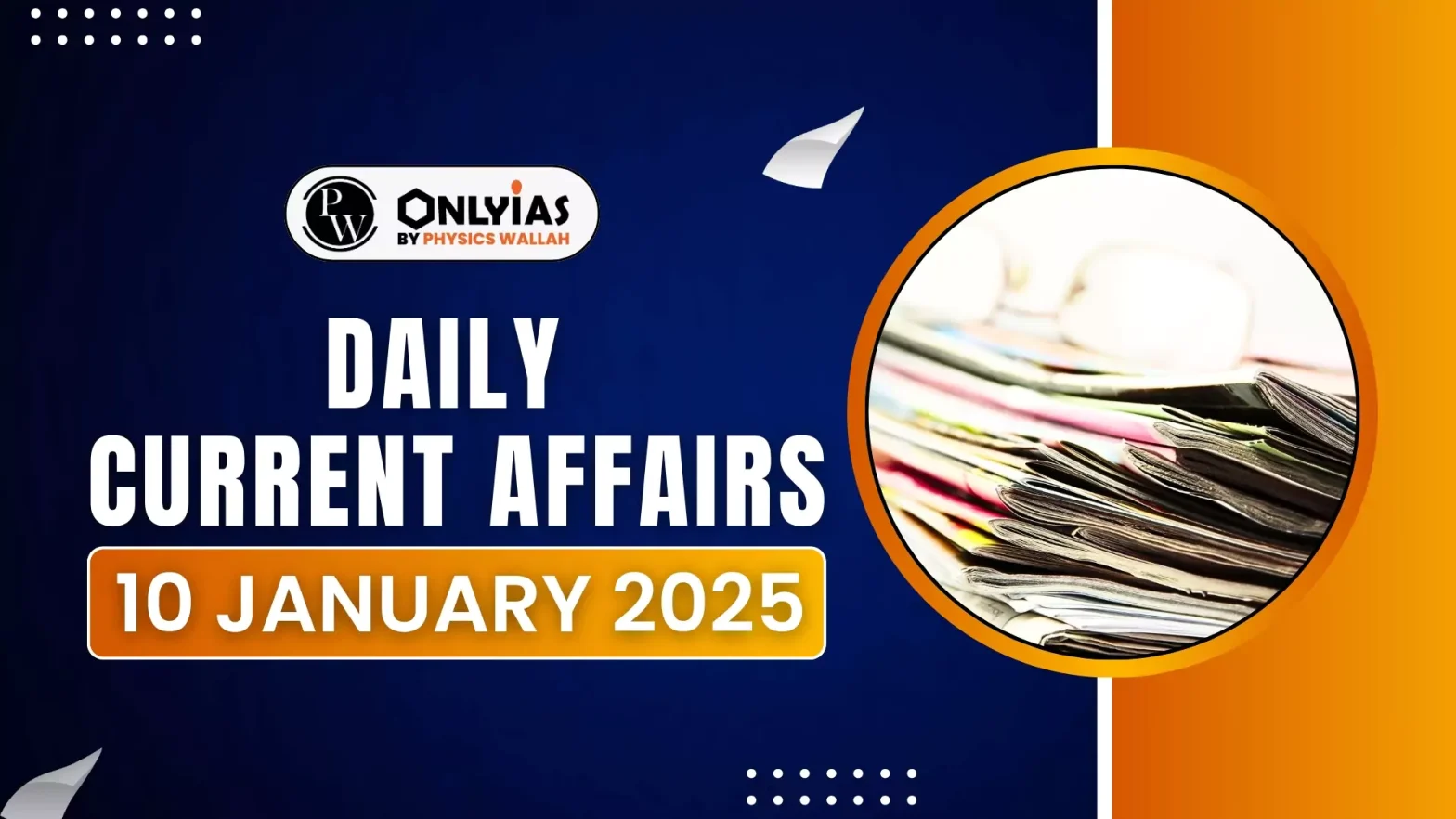The World Economic Forum’s bi-annual Future of Jobs Report 2025 edition has been released recently.
About the Future of Jobs Report 2025
- Aim: The report highlights evolving technological, societal and economic trends to understand occupational disruption and identify opportunities for workers to transition to the jobs of the future.
 Dataset: The Report is a result of an unique dataset derived from an extensive survey of 1,000 leading global employers, across 22 industry clusters and 55 economies
Dataset: The Report is a result of an unique dataset derived from an extensive survey of 1,000 leading global employers, across 22 industry clusters and 55 economies- Key Highlights:
- As per the report,170 million new jobs will be created by 2030 while 92 million are projected to be displaced.
- The job disruption will equate to 22 per cent of jobs by 2030.
- Drivers: The major drivers expected to shape and transform the global labour market by 2030 are,
- Technological Change: AI and information processing technologies (81%) will have the biggest impact followed by Robots and autonomous systems (58%) and energy generation and storage technologies (41%) to transform their business by 2030
- Geoeconomic Fragmentation: Increasing protectionist measures by governments globally like imposing trade and investment restrictions, increasing subsidies etc pose a medium-term risk to global economic growth reducing opportunities for open innovation and technology transfer
- Economic Uncertainty: Easing inflation and looser monetary policy offers some optimism but slow growth and political volatility keep many countries at risk of economic shocks.
- Demographic Shifts: The report indicates that 40% of employers worldwide, aging and declining working-age populations are driving transformation, while 25% are being transformed by growing working-age populations.
- Green Transition: Industries such as Automotive and Aerospace, and Mining and Metals will undergo significant organizational transformation as workers will go for upskilling and reskilling to transition to alternative jobs as they move toward decarbonisation.
Enroll now for UPSC Online Classes
Top 10 Fastest Growing Jobs By 2030
- Big data specialists
- FinTech engineers
- Artificial Intelligence (AI) and machine learning specialists
- Software and applications developers
- Security management specialists
- Data warehousing specialists
- Autonomous and electric vehicle specialists
- UI and UX designers
- Light truck or delivery services drivers
- Internet of things specialists
|
-
-
- Trends in Skill Sets: The skill sets that will see a rise in the next few years between 2025 and 2030 are AI, big data, cybersecurity, creative thinking, multilingualism etc.
- Creative thinking skill witnessed a net increase of 66 per cent along with the skill of “resilience, flexibility and agility”.
- Least Growth: The skills of ‘dependability and attention to detail’ saw only 12 per cent growth
- Negative Growth: The skill of ‘Reading, writing and mathematics’ saw negative growth at 4 per cent and ‘manual dexterity, endurance and precision’ at -24 per cent.
- Fastest Growing Jobs:
- Percentage Terms: AI and machine learning, software and application developers, and FinTech engineers, technology and specialist roles will see a rise
- Absolute Volume Terms: Frontline job roles like farmworkers, delivery drivers, construction workers, salesperson, food processing workers
- Care Economy: Jobs like nursing professionals, social work, education roles, such as secondary school teachers etc
- Essential Sectors: Demographic trends drive growth in demand across essential sectors like care and education for the highest job growth by 2030 in terms of volume.
- Fastest Declining Jobs: The list was topped by postal service clerks, bank tellers and related clerks, data entry clerks, cashiers and ticket clerks, graphic designers.
- Other Roles: It included printing and trades workers, accounting, bookkeeping and payroll clerks, material-recording and stock-keeping clerks, transportation attendants and conductors, legal secretaries and telemarketers.
- Focus on India:
- Drivers: The primary trends that are expected to shape the future of jobs by 2030 are, increased digital access, geopolitical tensions and climate-mitigation efforts.
- Investments: There is an increased investment by companies in technologies like AI, robotics and autonomous systems, along with energy technologies.
- Technology Adoption: India is expected to outpace global adoption in certain technologies like semiconductors and computing technologies (35%) and 21 per cent expecting quantum and encryption to transform their operations
- Fastest Growing Job Roles: Big data specialists, AI and machine learning specialists, and security management specialist
Check Out UPSC NCERT Textbooks From PW Store
The World Economic Forum
- The World Economic Forum (WEF) is an international not-for-profit organization that focuses on promoting cooperation between the public and private sectors.
- Establishment: The WEF was established in 1971 as European Management Forum by German economist Klaus Schwab
- The organisation changed its name to the World Economic Forum in the year 1987.
- Headquarters: Cologny-Geneva.
- Mandate: The main goal of the forum is to foster a spirit of collaborative entrepreneurship to address global issues and shape governmental, industry, and social agendas.
- Funding: The WEF is funded by member companies that are global enterprises having more than five billion dollars in turnover.
- Major Reports: The Global Competitiveness Report, the Global Gender Gap Report, the Global Risk Report, the Energy Transition Index, Global Travel and Tourism Report etc.
|
![]() 10 Jan 2025
10 Jan 2025

 Dataset: The Report is a result of an unique dataset derived from an extensive survey of 1,000 leading global employers, across 22 industry clusters and 55 economies
Dataset: The Report is a result of an unique dataset derived from an extensive survey of 1,000 leading global employers, across 22 industry clusters and 55 economies